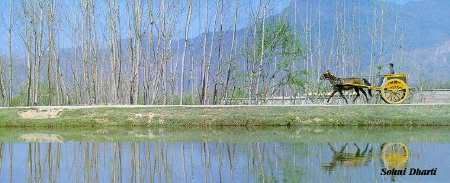Adil Najam
One of the earliest posts I did on ATP was called ‘Tangay Walla Khair Mangda.’ It was a Picture of the Day post and used the tanga/tonga picture that we now often use on the masthead.

The song by that name is a particular favorite of mine, both for its music and for its message. As I was listening to it today, I was reminded of that post and how far this blog has come since then. We now have more readers than I had ever imagined having, a bursting set of discussions, and a whole host of new friends who we have never seen but meet each day.I am thankful for all of this. But I must confess that sometimes – especially as I sometimes sift through needless sarcasm, provocations, and anger in the comments section – I miss the old days.
Much like I sometimes miss going to school on a tanga, even as I conference-hop across the globe on huge impersonal jetliners. There is something more personal, more civil, more familiar, more human about small communities. In a tanga, even a communal one, you get to know everyone. You share your ganderis with everyone when you are in a tanga. In a jetliner you sit next to someone for 22 straight hours and often do not share a single word; and when you do it is more likely to be a nasty look because they pushed back their seat too far or something!
As you can see, I am in a rather pensive mood today. I apologize. That is why I was listening to this song. It always cheers me up.
I must confess, I still see my own role on ATP as that of the tangay wallah. I cannot take people where they do not wish to go. Its their journey and their destination. But like actor Lala Sudhir and singer Masood Rana in Baba G.A. Chishti’s immortal song, I too see, as the song says, ‘banda rang rang da‘ and I too sing the song of ‘Khair’ (I guess here it means something like ‘goodness’ and ‘friendship’) for everyone. That, I guess, is the best that one can ever do.
So, dear friends, here is a video of the song – from the 1964 movie Daachi. The video quality is really bad, but the sound quality is descent. Do watch it if you can. It is really quite wonderful once you get past the picture quality. Note, for example, the shaadi band, the train, the guy on the bicycle and much more. But if you can, focus on the words. I hope even non-Punjabi speakers will get the gist: peace and friendship to all!



















































Me too. Me too. I also went to my primary school on a Tonga with twelve kids piled up on each other. There was even a third seat in Mushtaq’s Tonga. He loved us so much he even occasionally treated us with “Chaney” or “Chhalli” which our parents compensated him for later on. And talk about movies. Does any one remember film “Yakey Wali” with Mussarrat Nazir in the title role. Incidentally, “Yaka” comes from Persian “Yak” for one. You know, one horse Tonga.
Thanks all. For some reason this song always has a soothing effect on me. I think it is the very best and most memorable song by Masood Rana, but it is also more than that. Note also how Baba Chisti invokes certain VERY PAKISTANI sounds into the song — the shaadi ka baand when the baraat comes in and the very Sohail Rana-esque train sound when the railway engine passes by.
Ahmed, I agree that ‘Khair’ here is untranslatable but I do like Naveed’s notion of it being ‘contentment’ better than anything I had suggested.
sir chaa gay hain.
Good post! Good song!
Even though I can relate to this particular tangay-walla in the post, my perception of them is slightly different. I am thinking of the tangay-wallas in Peshawar where I spent considerable part of my life.
One thing, when there were young women passengers in the back seat, even though covered in burqa or chaddar, the tangay walla would get into a flamboyant mood. Instead of remaining in his seat he would stand up with one foot in the stirrup of the tanga, tilt his cap forward, brandish his chaabak (whip) and loudly talk to the horse, encouraging him to move faster, praising him if he did and admonishing when he did not. He was no different than a strutting peacock trying to catch attention. But all this was a harmless show.
Occasionally, however, when there was a dispute between him and a male passenger, and there could be so many petty things that could cause a dispute, the tangay walla was capable of directing his chabak at the errant passenger just as he would at the non-cooperating horse.
Beautiful post. Invoked a strange nostalgia.